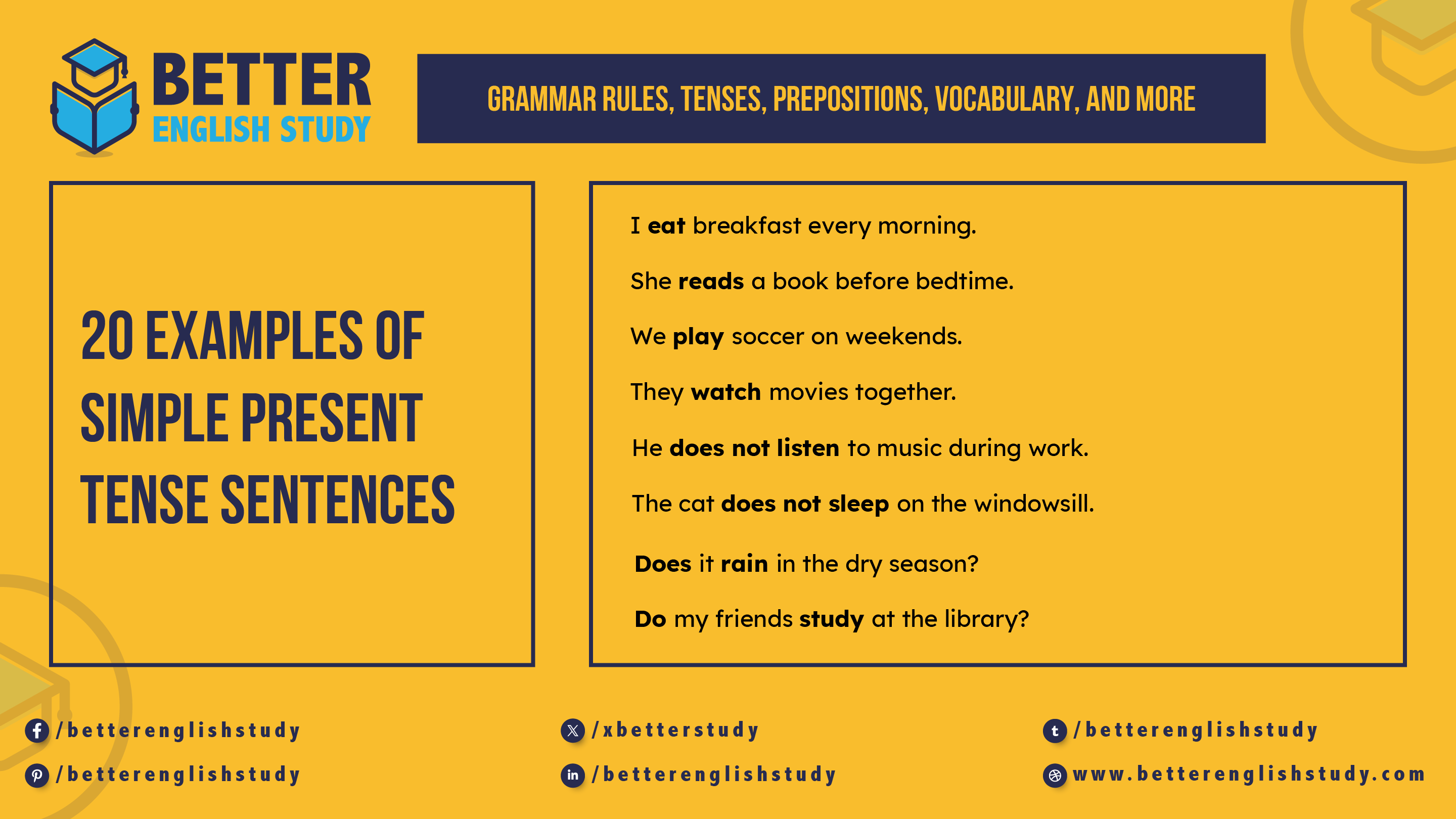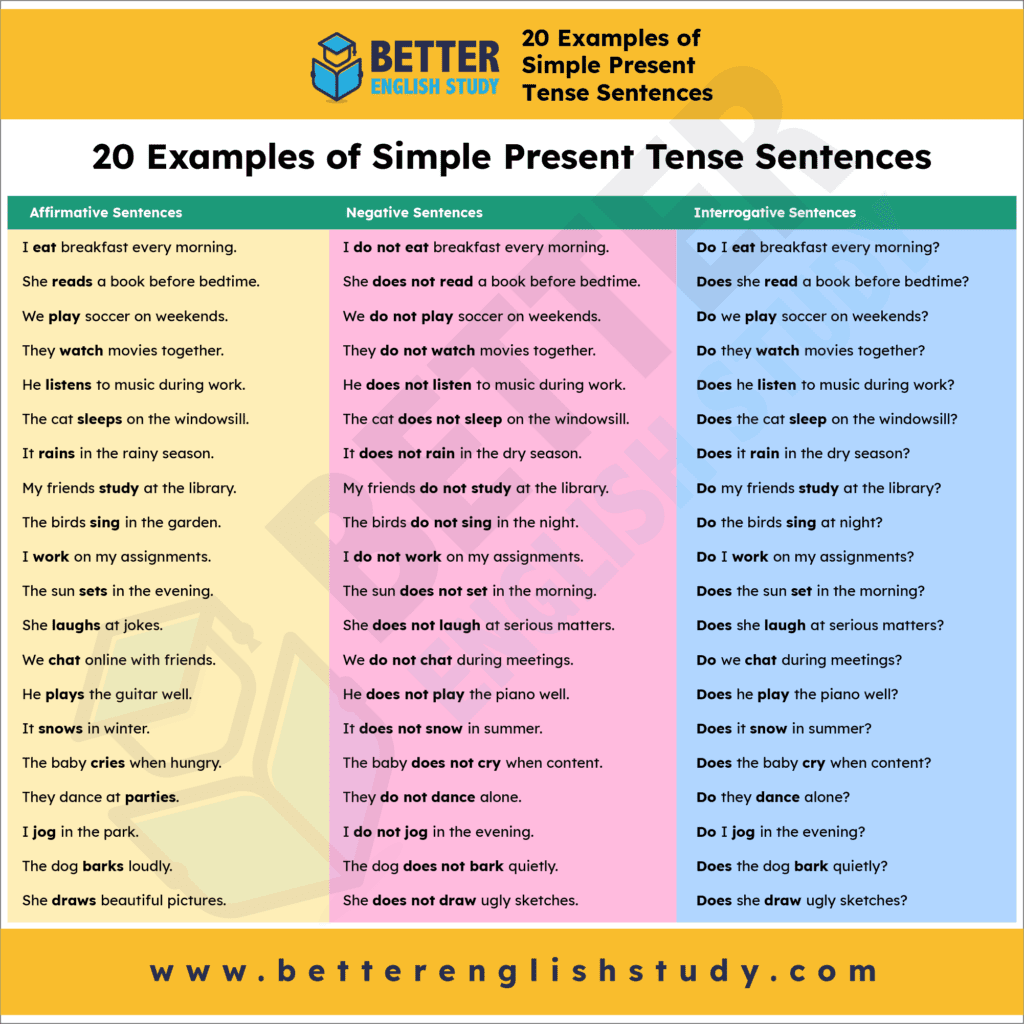
In the intricate tapestry of English grammar, the simple present tense is the foundational fabric upon which effective communication is woven.
Whether expressing routine actions, stating facts, or conveying timeless truths, the simple present tense plays a pivotal role in our day-to-day language.
This article will delve into examples of simple present tense sentences, illuminating the straightforward yet vital aspects of this grammatical structure for language learners.
Understanding Simple Present Tense
Before we explore examples, let’s grasp the essence of the simple present tense. This tense describes habitual actions, general truths, or regular events.
It is formed by using the base form of the verb, and unlike other tenses, it remains unchanged for all persons—first, second, and third.
Formula for Simple Present Tense
- Affirmative (Positive): Subject + base form of the verb (+s/es for third person singular) + object.
- Negative: Subject + do not/does not + base form of the verb + object.
- Interrogative (Question):Do/Does + subject + base form of the verb + object?
Now, let’s bring this concept to life through various examples.
1. Present Simple Tense Examples: Affirmative Sentences
- I eat breakfast every morning.
- She reads a book before bedtime.
- We play soccer on weekends.
- They watch movies together.
- He listens to music during work.
- The cat sleeps on the windowsill.
- It rains in the rainy season.
- My friends study at the library.
- The birds sing in the garden.
- I work on my assignments.
- The sun sets in the evening.
- She laughs at jokes.
- We chat online with friends.
- He plays the guitar well.
- It snows in winter.
- The baby cries when hungry.
- They dance at parties.
- I jog in the park.
- The dog barks loudly.
- She draws beautiful pictures.

2. Present Simple Tense Examples: Negative Sentences
- I do not eat breakfast every morning.
- She does not read a book before bedtime.
- We do not play soccer on weekends.
- They do not watch movies together.
- He does not listen to music during work.
- The cat does not sleep on the windowsill.
- It does not rain in the dry season.
- My friends do not study at the library.
- The birds do not sing in the night.
- I do not work on my assignments.
- The sun does not set in the morning.
- She does not laugh at serious matters.
- We do not chat during meetings.
- He does not play the piano well.
- It does not snow in summer.
- The baby does not cry when content.
- They do not dance alone.
- I do not jog in the evening.
- The dog does not bark quietly.
- She does not draw ugly sketches.
3. Present Simple Tense Examples: Interrogative Sentences
- Do I eat breakfast every morning?
- Does she read a book before bedtime?
- Do we play soccer on weekends?
- Do they watch movies together?
- Does he listen to music during work?
- Does the cat sleep on the windowsill?
- Does it rain in the dry season?
- Do my friends study at the library?
- Do the birds sing at night?
- Do I work on my assignments?
- Does the sun set in the morning?
- Does she laugh at serious matters?
- Do we chat during meetings?
- Does he play the piano well?
- Does it snow in summer?
- Does the baby cry when content?
- Do they dance alone?
- Do I jog in the evening?
- Does the dog bark quietly?
- Does she draw ugly sketches?
Great job! You’ve now mastered the simple present tense. Keep using these structures in your daily conversations; you’ll effortlessly express present actions.
Keep up the fantastic work on your language journey!
